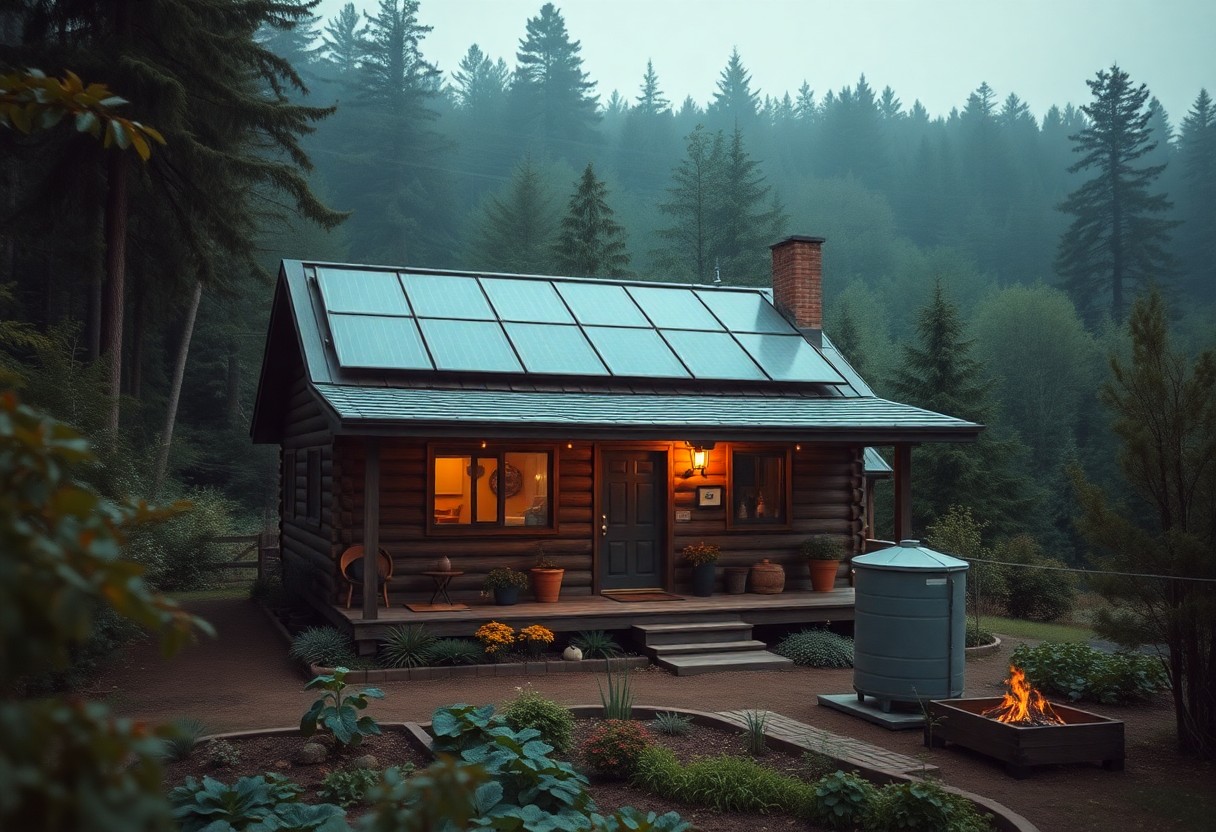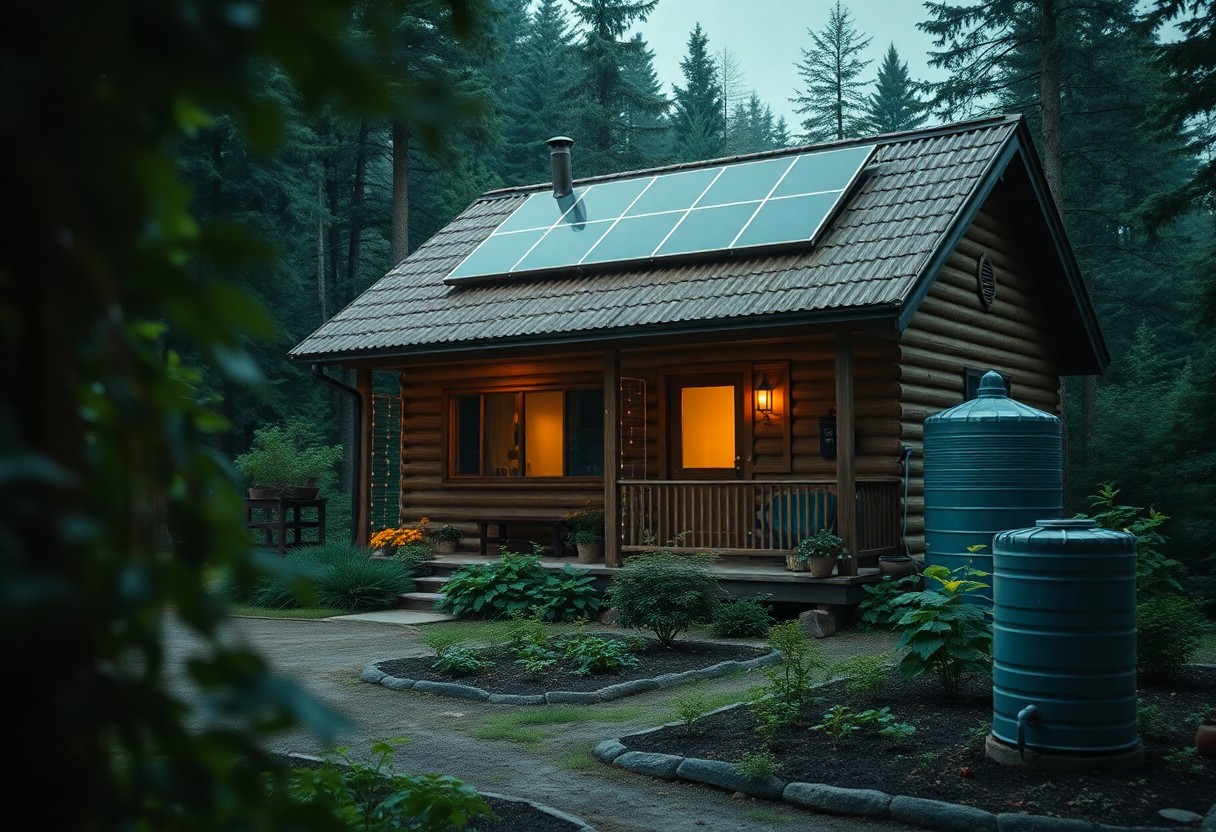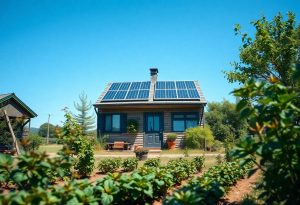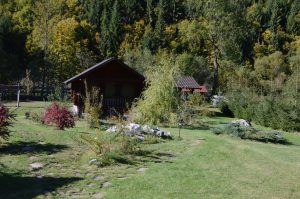Over the years, the desire for a sustainable off-grid lifestyle has grown as more individuals seek independence from traditional systems. By building resilience through self-sufficiency and resourcefulness, you can enhance your quality of life while protecting the environment. This guide will equip you with necessary strategies for creating a lifestyle that not only sustains you but also promotes community resilience and ecological balance. Get ready to transform your living space into a flourishing haven that thrives regardless of external challenges.
Key Takeaways:
- Self-Sufficiency: Emphasize your ability to grow your own food, generate energy, and manage resources independently.
- Resource Management: Learn effective methods for conserving water, power, and food to reduce waste and maintain sustainability.
- Community Connections: Build relationships with neighbors and local groups to share knowledge, resources, and support systems.
- Adaptability: Stay open to change and be willing to modify your practices based on environmental conditions and personal experiences.
- Skill Development: Invest time in learning vital skills, such as gardening, cooking, and basic repair work, to enhance your off-grid capabilities.

Understanding Resilience in Off-Grid Living
The journey towards off-grid living is not just about self-sufficiency; it’s also about cultivating resilience. Resilience in this context refers to your ability to adapt and thrive despite the challenges that arise from disconnecting from traditional systems. By embracing resilience, you can create a lifestyle that withstands external pressures and allows you to flourish in your off-grid environment.
Defining Resilience
OffGrid living requires you to develop a mindset that embraces change and uncertainty. Resilience involves the adaptability that enables you to navigate unforeseen challenges, whether they are related to energy supply, resource shortages, or environmental factors. By developing resilience, you empower yourself to turn obstacles into opportunities.
Importance of Sustainability
While exploring off-grid living, you must understand the importance of sustainability. Adopting sustainable practices not only benefits your lifestyle but also ensures that you are preserving the environment for future generations. By being conscious of your resource consumption and waste production, you foster a balanced ecosystem and contribute positively to your surroundings.
Defining sustainability in your off-grid life means making choices that have a lasting impact. You should focus on using renewable energy sources, conserving water, and minimizing waste. By doing so, you lessen your reliance on non-renewable resources and decrease your carbon footprint. This not only enhances your self-sufficiency but also creates a healthier environment. Ultimately, sustainable practices support the resilience of your off-grid lifestyle, ensuring that you can adapt to challenges while contributing to a more sustainable future.
Essential Factors for an Off-Grid Lifestyle
One of the first steps towards achieving a sustainable off-grid lifestyle includes evaluating key components. Consider the following necessary factors:
- Location selection
- Resource availability
- Energy generation options
- Water supply systems
- Waste management solutions
Assume that each of these elements plays a vital role in your journey to successful off-grid living.
Selecting the Right Location
Location is foundational to your off-grid lifestyle. Evaluate factors like climate, soil quality, and proximity to necessary resources. Your chosen site should also provide enough space for your plans, whether it’s gardening, energy installations, or livestock. A well-thought-out location enables self-sufficiency and resilience.
Assessing Resource Availability
Any off-grid lifestyle hinges on assessing the availability of necessary resources. You must identify sources for your basic needs, such as water, food, and energy. This includes understanding local weather patterns and seasonal changes that might affect your crop yields or water supply. Choose resources wisely to minimize dependencies and enhance sustainability.
Essential factors such as local water sources, available soil fertility, and sunlight exposure are vital in determining your capacity for self-sufficiency. Ensure your chosen site has both short-term and long-term access to these resources, as fluctuating conditions can impact your lifestyle. For instance, lacking a steady water source can lead to reliance on external supplies, making your off-grid plan less sustainable. By thoroughly understanding what resources you have at your disposal, you can create a safer and more resilient off-grid environment.
How to Set Up Off-Grid Energy Sources
Your journey towards a sustainable off-grid lifestyle begins with understanding how to effectively set up energy sources that cater to your needs. Off-grid living gives you the freedom to harness renewable energy, significantly reducing your carbon footprint and dependence on conventional energy systems. Explore various energy solutions, such as solar power and wind energy, to devise a reliable setup that aligns with your lifestyle and the natural resources available to you.
Solar Power Installation
There’s a growing interest in solar power installation as a reliable energy source for off-grid living. By investing in quality solar panels, inverters, and battery storage systems, you can generate and store energy from the sun. Assess your energy needs and the sunlight availability in your area to design a solar system that will meet your requirements throughout the year.
Wind Energy Solutions
On the other hand, wind energy solutions can complement your off-grid energy strategy, especially in areas with consistent winds. By installing a wind turbine, you can harness nature’s power to generate electricity. Choose a properly sized turbine based on your energy needs and wind conditions, ensuring you have a well-placed, sturdy setup to maximize efficiency.
Energy from wind can significantly enhance your off-grid energy resilience. Wind turbines can produce power even on cloudy days, making them a valuable addition alongside solar panels. However, installation requires careful assessment of wind speeds and site conditions. Ensure proper safety measures during installation, as improper setups can pose risks. Regular maintenance of your wind turbine will also extend its lifespan and efficiency, ultimately supporting your sustainable lifestyle.
Water Supply and Management Tips
Not having a reliable water source can hinder your off-grid lifestyle. Focus on establishing a sustainable system by implementing the following tips:
- Prioritize water conservation techniques.
- Invest in quality filtration systems.
- Create efficient water storage practices.
- Regularly maintain and assess your water sources.
Recognizing the importance of effective water management will ensure a sustainable off-grid living experience.
Harvesting Rainwater
For those living off-grid, utilizing rainwater can be an efficient solution for your water supply. Set up a rainwater collection system with gutters and barrels to capture and store this natural resource. Ensure your system is equipped with a quality filter so that the water is safe for consumption.
Well Drilling Considerations
Harvesting a well can provide a reliable water source; however, there are several factors to consider. Assess local regulations regarding well drilling and confirm the availability of water within your area. Professional help can guarantee proper depth and safety, as digging too shallow could result in contamination. Additionally, you must consider the costs associated with drilling and the ongoing maintenance of the well.
Well drilling can be a significant step towards sustainable water access at your off-grid home. Choosing a reputable contractor with experience can ensure your well meets local regulations and minimizes the risk of contamination. You must also evaluate your water needs and check the depth of the aquifer; a shallow well may not yield sufficient water during dry periods. Regularly testing your well water for quality is necessary to ensure it remains safe for your family. With careful planning and execution, you can create a lasting and safe water supply.
Sustainable Food Production Techniques
Despite the challenges of off-grid living, sustainable food production techniques can provide you with a self-sufficient lifestyle. By utilizing a variety of methods, you can cultivate nutritious crops and raise animals, greatly reducing your reliance on external food sources. This not only supports your health but also fosters a closer connection to nature and your environment.
Gardening and Permaculture
While traditional gardening methods have their benefits, permaculture goes a step further by designing ecosystems that work in harmony with nature. This approach allows you to create a resilient garden by incorporating diverse plants, using natural fertilizers, and practicing crop rotation, all of which improve soil health and yield.
Livestock Management
Any successful off-grid food production plan includes effective livestock management. Raising animals not only provides a sustainable source of meat, eggs, or dairy but also contributes to soil fertility through manure. You’ll need to ensure their safety and well-being by providing proper housing, ventilation, and clean water. Additionally, carefully managed grazing can help prevent overgrazing and support land regeneration.
Techniques for livestock management include developing a rotational grazing system that allows you to manage pasture health while maximizing forage yield. This practice keeps your animals healthy and happy, reducing the need for antibiotics or additional feed. You should also consider integrating animals into your garden design to create a synergistic environment. For example, chickens can help control pests and aerate the soil, while their droppings serve as a valuable nutrient source. Prioritizing animal welfare leads to a more productive and balanced system, benefiting both your food production and overall off-grid living experience.
Building Community and Support Networks
Many people underestimate the value of building strong community ties when pursuing an off-grid lifestyle. By fostering connections with like-minded individuals, you create a support network that offers resources, skills, and emotional encouragement. Collaborating with others not only enhances your off-grid experience but also bolsters your resilience against potential challenges, making your journey more sustainable and enjoyable.
Finding Like-Minded Individuals
If you seek to surround yourself with others who share your off-grid vision, local meetups, online forums, and social media groups can be excellent platforms. Participating in workshops or community events can also help you identify potential partners in your quest for a sustainable lifestyle. Engaging with these groups creates a sense of belonging, amplifying your chances of success.
Resources for Off-Grid Communities
Community resources play an integral role in strengthening your off-grid lifestyle. Sometimes, you’ll find directories that list nearby homesteaders and off-grid enthusiasts, allowing you to connect for mutual aid. Additionally, libraries, co-ops, and community centers may offer workshops on important skills, such as sustainable gardening or renewable energy technologies. Joining local organizations can also provide you with access to shared resources, tools, and equipment, enhancing your overall sustainability.
Networks for off-grid communities can be invaluable for sharing knowledge and resources. Engaging with platforms dedicated to off-grid living opens doors to vital information including tips, safety practices, and success stories from others who have begined on similar journeys. Many of these networks also offer tools for collaboration among members, which can lead to shared projects, bulk purchases, or pooling resources. Connecting with these communities ensures you won’t face challenges alone. Instead, you will draw on a collective wealth of experience, making your off-grid transition smoother and more secure.
Conclusion
As a reminder, building resilience in your off-grid lifestyle requires careful planning, consistent learning, and adaptability. By investing time and effort into acquiring skills, sourcing sustainable resources, and fostering a strong sense of community, you enhance your ability to thrive outside traditional systems. Embrace the challenges as opportunities for growth, ensuring that your off-grid journey not only meets your needs but also contributes positively to the environment and society as a whole. Your commitment to sustainability will pave the way for a fulfilling and self-sufficient life.
FAQ
Q: What does it mean to have an off-grid lifestyle?
A: An off-grid lifestyle refers to living independently of traditional utility services such as electricity, water, and gas. This means utilizing renewable resources, such as solar or wind energy, and having systems in place for water collection and waste disposal. The goal is to achieve self-sufficiency and reduce dependence on external infrastructures.
Q: How can I start building resilience in my off-grid living setup?
A: Building resilience in an off-grid lifestyle involves creating systems that can withstand unexpected challenges. This includes diversifying your energy sources (e.g., solar panels, wind turbines, and backup generators), storing water effectively (through rainwater harvesting), and growing a variety of crops for food security. Additionally, it’s helpful to learn vital skills such as first aid, woodworking, and basic vehicle maintenance to enhance your independence.
Q: What are some sustainable practices I can adopt in my off-grid lifestyle?
A: Sustainable practices for an off-grid lifestyle include composting kitchen waste to enrich soil for gardening, using permaculture techniques to create a self-sustaining ecosystem, and employing energy-efficient appliances that minimize power consumption. Incorporating rainwater collection systems also ensures a sustainable water supply while reducing reliance on municipal water sources.
Q: How do I ensure my off-grid systems are cost-effective?
A: To maintain cost-effectiveness in off-grid living, start with a thorough budget that covers initial setup costs and ongoing maintenance. Consider DIY solutions where possible, such as building your own solar array or rainwater catchment system. Research and utilize grants or incentives for renewable energy projects. Additionally, focus on investing in high-quality materials and equipment that will have longevity, reducing the need for frequent replacements.
Q: What are some common challenges faced when living off-grid, and how can I prepare for them?
A: Common challenges of off-grid living include extreme weather conditions, equipment failures, and isolation. To prepare for these issues, conduct regular maintenance checks on your systems, keep a well-stocked supply of vital tools and spare parts, and establish a network with other off-grid enthusiasts for support and shared resources. Building strong community ties can alleviate feelings of isolation, while also enhancing problem-solving capabilities through collaboration.




